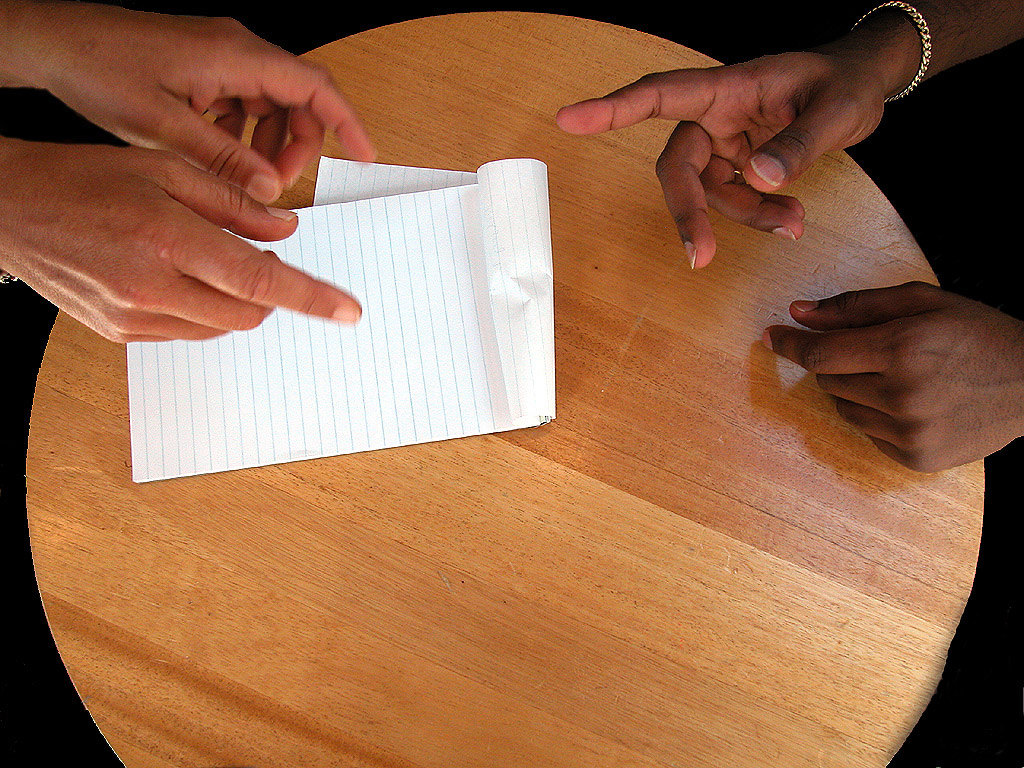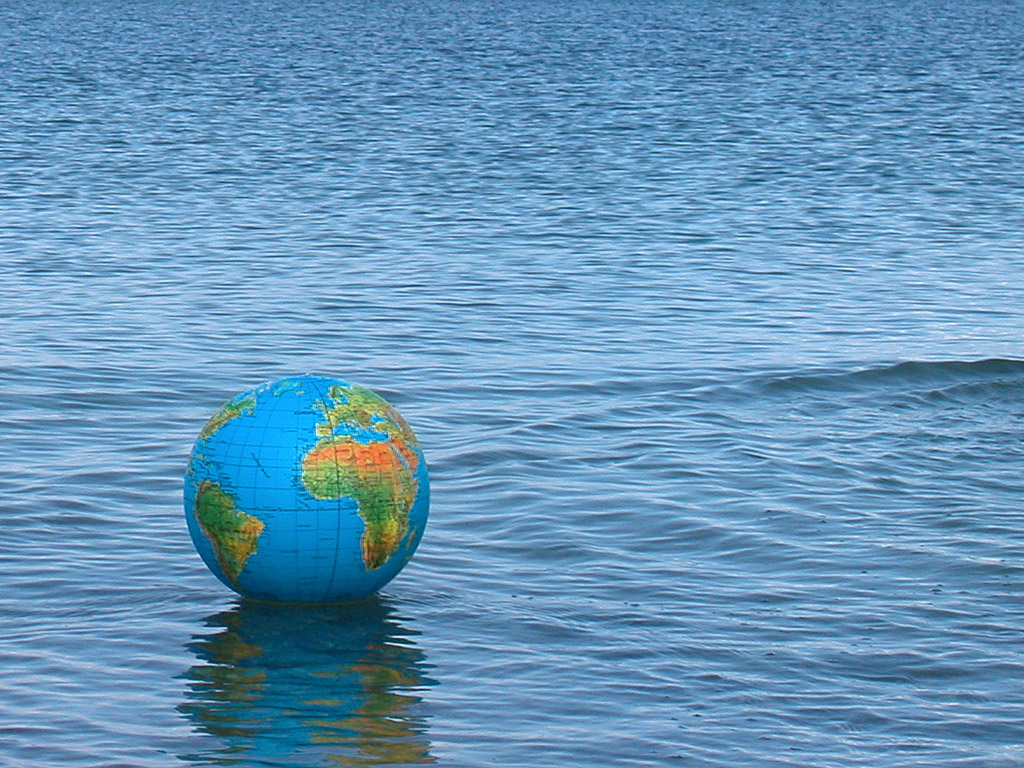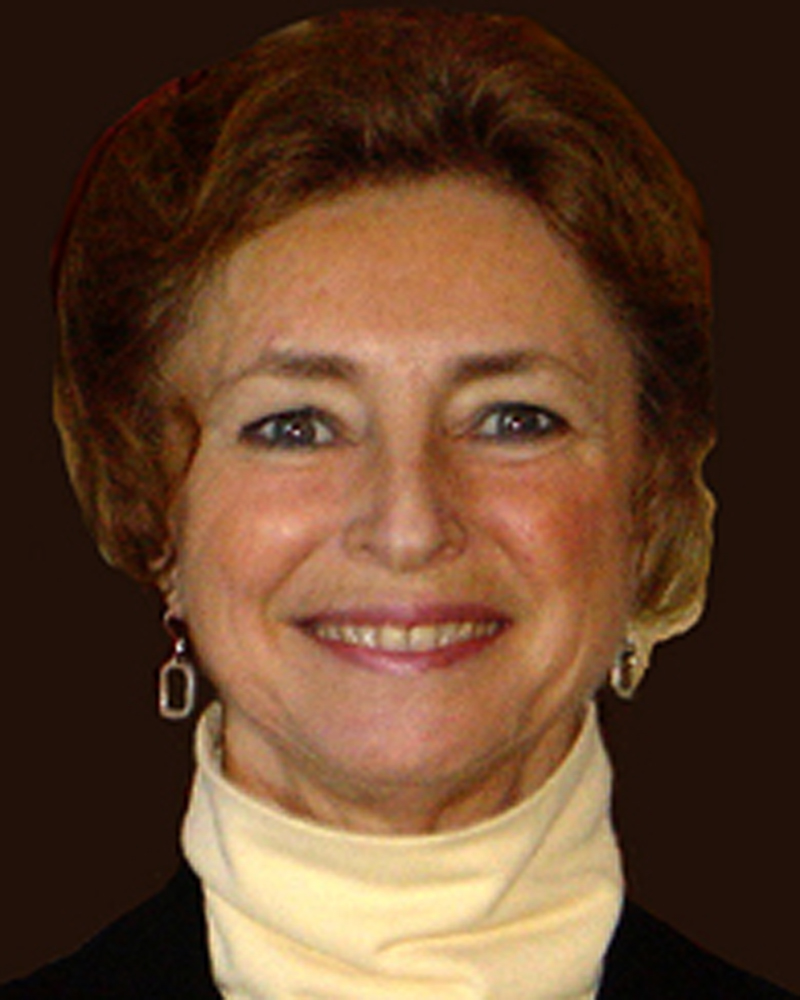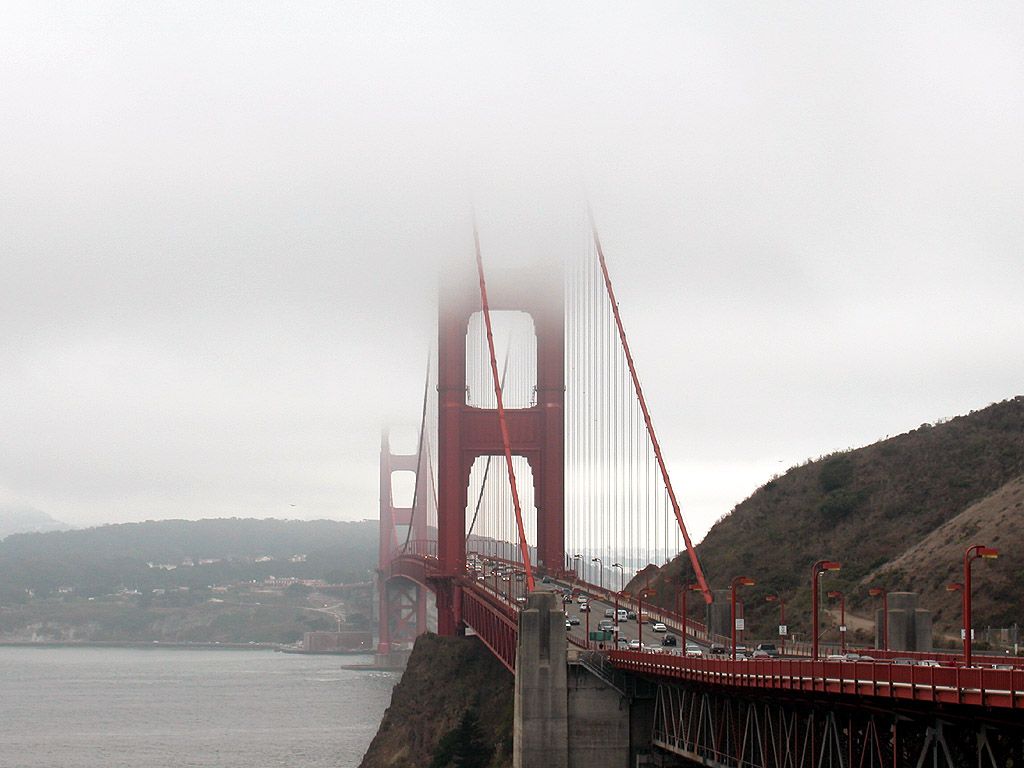The World Café - Engaging Dialogue
Juanita Brown, USA
In this conversation Juanita Brown, who has worked with and written about the World Café, tells about its origin and how it has spread globally on six continents.
We talked in her house which is situated in a wonderful mountainous landscape near San Francisco. In Denmark we have learned about World Cafés as a process of creating dialogue about things that matter from Finn Voldtofte and Toke Paludan Møller.

How the World Café was Born
It might be good to start with the story of how the World Café was born because it will help to open the conversation about, what the World Café is.
In 1994 and 95 David Isaacs, my partner and I were hosting a series of strategic dialogues on intellectual capital with Leif Edvinsson from the Skandia Corporation in Sweden. Finn Voldtofte from Denmark was also here for those conversations. As luck would have it on one of the mornings it was pouring rain. We would normally serve breakfast outside on the patios of our home, and then go inside to begin the dialogue.
David said: "We can't have the people go outside in this rainstorm. Why don't we put up our little TV-tables and our plastic lawn chairs in the living room to serve breakfast. When it is time we will put the tables away and start the dialogue." I said: "I think those tables need some tablecloths and flowers, and I took large sheets of paper and flowers and put them on the tables, like they some times do in cafés. Then our graphic recorder came in and said: "Wow, this is starting to look like a café, I think I will put some markers for doodling in the middle of the tables." She also made a nice little sign for our front door saying: "Welcome to the Homestead Café."
When people walked in they said: "Oh, a café, how wonderful." It was as if they had clicked into the mindset of a café. We noticed that people started to talk together and draw on the tablecloths, just like they do in many cafes. So we decided to ask them to stay where they were and go on exploring the relationships between leadership and intellectual capital, which was the topic for the day.
People continued to focus and develop little models on their tablecloths. Then one of the members said: "Why don't we leave one host at the table and have the others travel to different tables carrying the seed ideas from their first conversation into the second one. If I was the host three new people would come to my table and we would share ideas. Thus people began to link, build and expand their ideas on the tablecloths. After another half hour one person said: "Why don't we switch again, and see what happens." By then there was a very special energy in the room.
Just before lunchtime we rolled a large sheet of paper in the middle of the floor and put the tablecloths around the edges. Then we asked people to take a tour of the tablecloths to sense the patterns and insights that were in the middle. And our graphic recorder began to pool in the centre the core ideas that were emerging from the multiple conversations.
When we were walking down to lunch Finn and l looked at each other and said: "What happened here?" Something vibrant, rich and alive had taken place. It was not just producing knowledge, it was as if something deeper was revealing itself through all these new connections and the cross-pollinating of ideas as people moved from table to table through the several rounds of conversation.
Out of that first experience the World Café pattern evolved, although we hadn’t yet articulated what we later discovered were the seven key design principles for hosting World Café dialogues.
- Setting the context.
- Creating a hospitable space.
- Focusing on questions that matter.
- Cross-pollinating and connecting diverse perspectives.
- Encouraging everybody's contribution.
- Listening together to find what is in the middle of the table.
- Harvesting and sharing collective discoveries.
Most of us who were present representing seven or eight countries decided to go home and experiment with that basic pattern in our own situations. - That is how the World Café was born.
Our Early Discoveries
The next day Finn, David and I sat down to explore more deeply what we had experienced. One of the things we had discovered was the natural pattern by which knowledge travels, because our group was small enough to see these network dynamics. We were watching how human systems as living systems co-evolve and shape the future.
We had also discovered, that it was not necessary to teach people about dialogue, because everybody knows how to do it. There was something about the café itself that tapped into that shared memory. The café is only a modern form of the campfire as place for real conversations. It is the same pattern that existed in ancient times and that you probably find in every culture in some way. Finally we had discovered the importance of having a question that really matters in the centre to create the focus. Those were some of our early discoveries.
How the World Café spread Globally
Now the World Café approach to dialogue has spread all over the world. It is amazing. I think one of the reasons why it has spread is that there is something fun, real and natural about it. People with a minimal amount of group experience can do it anywhere. The idea is a very simple way for conversations that really matter to take place. Another reason is that you can easily host Café conversations with large groups of 500 or a 1000 people. The fact that we have done it in large groups has also helped spread the idea.
In Scandinavia World Cafés draw on the traditions of study circles and popular education. In Singapore, which has a very hierarchical culture, they tap into their tradition of neighborhood teashops. Mexico has a tradition called "little coffees" (cafecitos). If you invite someone to a "cafecito" they know that you are inviting them for a real conversation. I think that these traditions exist in one way or another in most countries. I feel that something in us as a species with language has always focused on questions that matter to the collective.
People are hosting World Cafés now in all six continents and counting just off the top of my head probably in something like 20 countries. They have among many other places been used in Israel to create dialogue between Jews and Palestinians.
World Cafés have been used in settings ranging from strategy work in big international corporations to sustainability work in Australia. The café work seems to translate very easily to different national and organizational cultures. If you have confidence in what you do and provide a sense of context people are generally very open to experimenting with this way of fostering collaborative dialogue.

How Life Works
I grew up in a very politically active environment. My parents were activists and my adopted grandmother in Mexico had left Switzerland during the war because she was an activist and had to get out. From my very earliest years I can remember people gathering around dining room tables and talking together about the things that really mattered.
Later in my life I went to work with the farm workers movement, where everything was organized around house meetings. People were in dialogue in small living rooms about their future and what they cared about. They went from one house to the other carrying key ideas, like bees pollinating new flowers.
That is how it dawned on me that the World Café was not just an event in the room, but this much larger pattern of how life works. Then I began to look at organizations and realized, that they are also networks of conversations. The realization has been reinforced by my own early life experience.
Our main theoretical inspiration for this work has been the Chilean evolutionary biologist Humberto Maturana. He believes that as human beings developed the capacity for language, we began to live in language and the meanings and imagery that language makes possible. And as we live and co-ordinate our activities in language we actually co-evolve the future through these webs of conversation and the meaning-making that is embodied in them. These networks of conversation and shared meanings are the medium for social evolution in human systems.
The physicist David Bohm, who oriented us to the consciousness-aspects of dialogue also inspired us. He pointed to the fact that there is some generative source of "the new", of "the possibilities" that dialogue can lift up from the soup of all possibilities and make manifest.
So, its’ our belief that the World Café in a room is just a small replica of how life works in general. The question then is how do we make this more intentional in a life affirming rather than a destructive way? How do we become more intentional on focusing those conversations on things that are positive and possibility oriented, and can we do it in time and on a large enough scale before we become extinct?
The very same processes can intentionally or not intentionally be used to basically terminate who we are as a species. Maturana says that there is no inherent reason, why we should continue to survive. The webs of conversation and the coordinated action that comes from them may as easily lead to extinction as to evolution.
To us that is the deeper reason for doing this work. I am a community organizer in my history and my roots. My vision is that if a large number of people around the world engage in conversations around questions that matter for their future with a life affirming intent, then we will be better off than if this doesn't happen.
Doorways to Dialogue
I don't see the World Café as the saviour. It is only one among many doorways to dialogue that we also love and respect. Whether they are indigenous councils, study circles, folk high schools, Bohmian dialogues, women's circles or public deliberation work. There are many different forms, but once you enter that space of authentic dialogue you know you are there.
That doesn't always happen in the World Café, just as it doesn’t always happen in other dialogue approaches, but if we are lucky we can learn to enter that space of true dialogue more consistently.
My big hope is that people will recognize that what they are participating in is not just about what is happening in a Café event, but that the basic Café pattern is what is also happening in life. And that by being intentional and hosting conversations that matter in their own lives and work, they are are connected to every other place where this is happening in a life affirming way.
We want people to take heart and hope from knowing that they are not alone. They are part of this living network of generative conversations around questions that matter that is growing stronger and more dynamic all over the world, what ever the method is. That is what the World Café really means to us.
When people experience collective wisdom, it feels like a spiritual experience to them. If being connected to that which is larger than oneself in a way that is full of meaning is spiritual, then this work can be considered spiritual. We are part of nature and our intelligence is part of nature's larger intelligence. When we collectively connect with that, we feel it. That is how I would describe it. Its’ not about being religious in a traditional sense or in an esoteric California way. The real question is how do we use this capacity in ways that will help us to survive together as a human community on this small planet.
Lets Talk
Whether in the United States or in the larger global context things are getting better and better and worse and worse at the same time. There is collective awareness, belief in sustainability, understanding of living systems, connection to spirituality and growing linkages among NGOs. All of these things are happening on a larger and larger scale all over the world, and the Internet is helping. But at the same time, we see polarization, fundamentalism, fragmentation, hostility, empire-building, terrorism and globalization in its negative aspects.
To me the deepest level of this dilemma is around the issue of polarization itself. The real possibility of the World Café lies in discovering ways that diverse viewpoints can learn to live in the same space in a constructive way.
Here in the United States we are very concerned that the polarization itself is what is dangerous to the future, not either one of the worldviews that are represented, say, by the Left or the Right. Therefore we have joined with a number of other American dialogue groups to sponsor a movement in the US called "Lets Talk America". The purpose is to bring "we the people", whatever our perspectives are, together to talk about what is deeper than our differences. What is it as Americans that we share? What is our best hope for this country and its role in the world? What could we imagine as the best legacy, that we could leave for our children and grandchildren? It’s important to discover what connects us rather than what divides us.
The current political climate in the US is very polarized. Discovering how to have conversations with those who feel as strongly about their perspectives as I do about mine is a very important societal goal. Democracy is a conversation it is not going to the voting booth alone.
To us the greatest richness of ideas and innovation comes from the diversity of thought available in relation to any situation. In that way you get the wisdom of the whole as part of the conversation. The more diverse perspectives you have the richer the outcome. In this context diversity is a criterion of getting good results more than it is a humanistic idea. When you have the whole represented in the room there is the potential to create higher quality outcomes.
I am very hopeful that all of this dialogue work will somehow make at contribution to bridging divides. And I think that the women - the mothers - will have a special role to play in highlighting the importance of our bridging our differences in order to create a legacy of hope for future generations. The weapons that exist in the world are so pervasive, that there is no natural reason why we should survive. So we all - women and men alike - have to hold the intention of being able to survive and thrive as a human community on this small planet. My hope is that the World Café can make some small contribution by contributing in some small way to our common future.

September 2004
